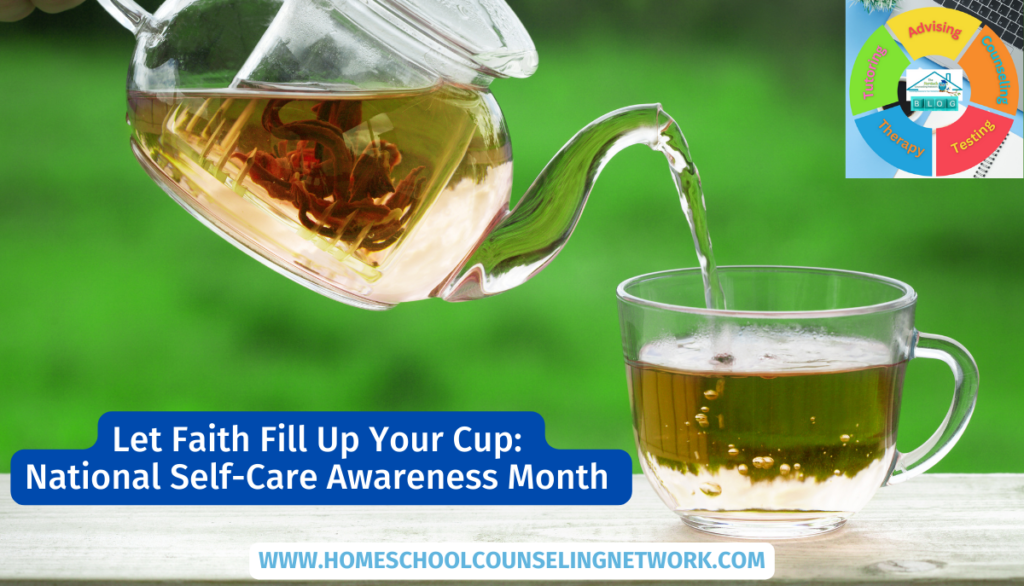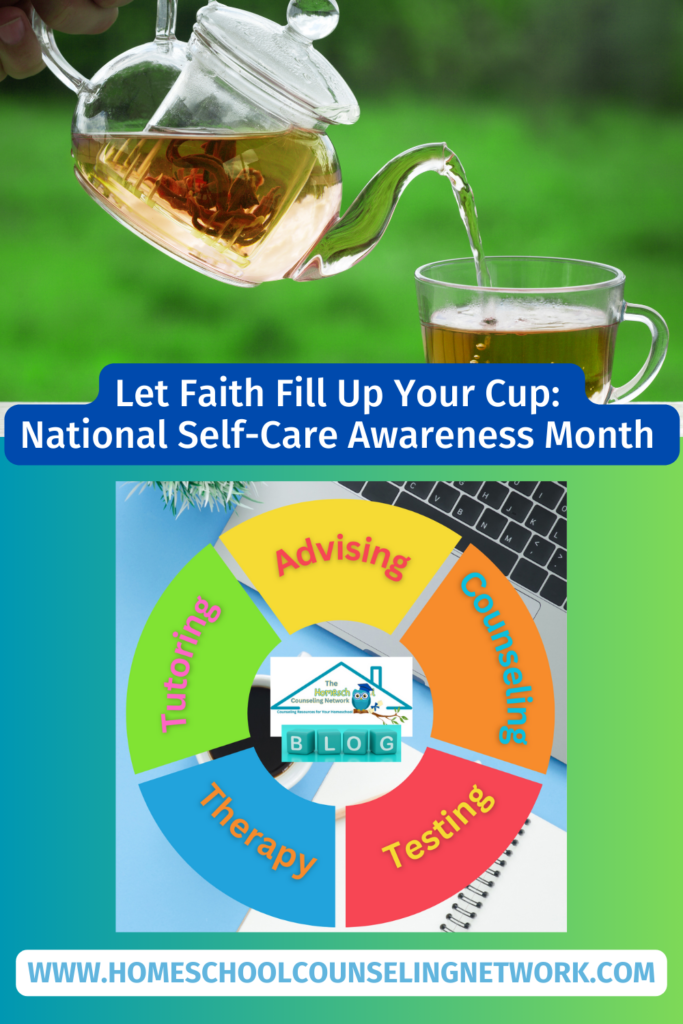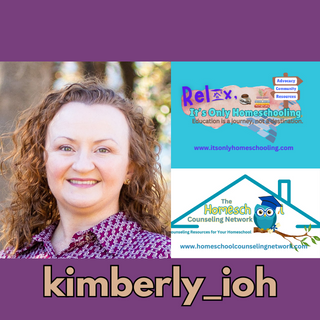Let Faith Fill Up Your Cup This National Self-Care Awareness Month

NEVER-ENDING TO-DO LISTS
If you are like me (well, quite frankly if you are like most parents) your to-do list is a mile long and growing. We cross off one task only to have it replaced by two more. Our busy lives sometimes feel like an endless cycle of appointments, events, activities, and engagements.
We set reminders on our phones. We sync our calendars. We arrange and rearrange our schedules.
And sometimes, we overschedule.
With so much on our plates sometimes the notion of taking a moment to attend to our own needs, no matter how brief, can be viewed as simply one more thing that has to get done. More often than not, THIS is the one item on our list that we overlook (that is if it makes it on the list at all).
As caregivers, teachers, helpers, and parents, we struggle with self-care. It is in our nature to be focused on others. When our physical, emotional, environmental, spiritual, relational, and mental energy stores are depleted, how do we fill up our cups?
Beyond Empty Pitchers and Oxygen Masks
Treat yourself. You deserve it. “Me” time.
Indulge. Splurge. Pamper.
In preparation for this article, I did a little research. A quick Google search for #selfcare produced a plethora of information. YouTube influencer tutorials for self-care rituals, major corporation advertisements for self-care products, personal blog entries, motivational speeches from helping professionals, and healthcare advice from physicians and researchers were only the tip of the iceberg.
There are apps to help you track your self-care routines! And even a National Self-Care Day, July 24th!
Whether splashed all over social media, touted in the taglines of consumer marketing campaigns, or masked in a meme, our society is bombarded with messages that we need to take better care of ourselves. As a society, we are in desperate pursuit of nurturance.
You cannot pour from an empty vessel.
Proverbs 1:23

The Heart of the Matter
The more I read about the topic, the more unsettled I became.
A simple data search quickly led to the comparison trap of whose self-care advice was better or which self-care routine would ultimately bring me nirvana. Quicker than a mouse click, a wave of urgency overwhelmed me. Fatigue quickly followed.
Scrolling through endless ideas of how best I could care for myself did not inspire me, quite the opposite. Rather than feeling restored, I felt drained.
With the influx of data buzzing around in my brain, I had reached the point of satiation but I certainly was not sated.
Before I fell further down the rabbit hole of anxiety, I practiced the POWER of the PAUSE. I closed my browser. I closed my laptop. I closed my eyes to shut out the “noise” of sensory and information overload.
I quieted my outside world so I could calm my inside world. I needed the stillness so I could hear. I wanted a deeper understanding of what the Lord was trying to say to me as a mom, a wife, a teacher, a counselor, and a steward.
At my core, I am a caregiver. Long before I chose a helping profession as my career (and before I had my own family to care for), I embraced a helper role. It is in my nature to nurture others. My writing efforts are simply another extension of that role. A role in which I strive to be a channel NOT a source.
When I write, I want the words on the page to be not my own, but those of my Heavenly Father. I want His guidance for my steps. I want to walk in obedience in my caring for others. To be effective, I must ensure I am fostering the Lord’s agenda and not my own to accomplish this goal. It ALL has to be His.
So I prayed. To hear the Lord’s guidance, I embraced the quiet.
Here is what I heard:
Information is not the same as knowledge. And knowledge is not the same as wisdom.
Information is data without context. Knowledge is the organization of data but without purpose. Wisdom gives us purpose. It takes the gathered data organized into knowledge and adds meaning. Wisdom brings us deeper.
Wisdom brings clarity and focus.
Wisdom discerns.
The Gift of Discernment
Discernment, the ability to judge well, is a gift.
Minister and author Mary Fairchild writes,
Discernment in the Bible is the spiritual characteristic of sound judgment for perceiving the difference between right and wrong, good and evil, truth and error, and identifying God’s will and direction for his people. Discernment is necessary to understand spiritual truth, live holy as God intends, avoid life’s pitfalls and dangers, and properly govern society.
The wisdom of discernment empowers us in the times we feel most powerless. When we feel overwhelmed and don’t know what to do, it guides our choices.
As Believers, we are commanded to treat our bodies as temples and respect them with reverence. Our Creator rested on the seventh day of Creation. Jesus sought respite by retreating to places of solitude to pray.
Self-care is a beautiful tool in our wellness toolbox.
But it is not our only tool.
Even the correct tool if misused for the wrong purposes can be useless at best and harmful at worst. A hammer is great for pounding nails but I wouldn’t recommend it for cracking eggs. No one wants to eat THAT omelet.
So, in our pursuit of filling up our cups, how do we know which tool is best to use?
More importantly, where do we acquire these tools?
Living Water for Your Life’s Garden
Discernment is a spiritual gift bestowed upon us by the Father. We receive this gift by welcoming the Holy Spirit into our lives and studying and meditating on God’s word.
As with any other spiritual gift, discernment requires proper care and cultivation to grow.
But grow in the grace and knowledge of our Lord and Savior Jesus Christ. To him be glory both now and forever! Amen.
2 Peter 3:18
The gift of discernment enables Believers to differentiate between right and wrong, good and evil. As we pour the Living Water of Jesus Christ into our lives, we are cleansed. Just as we bathe every day to keep our bodies healthy, we need to bathe daily in Living Water to keep our thoughts, minds, and spirits in good health.
Jesus was the preeminent role model for discernment. How do we as his followers grow in this gift?
Worship leader, speaker, and writer Jessica Van Roekel of Welcomegrace.com imparts the following tools to help us grow:
- Gain Knowledge – Study God’s word daily. Meditate on it. (Proverbs 18:15)
- Apply Understanding – As we gain knowledge of God’s word, we must protect it and learn to apply it accordingly. In today’s society, we are besieged by a barrage of “new” information. God’s word, however, is unchanging. As we filter through the constant stream of data and apply it to our lives, we can draw on our discernment caches for guidance when faced with moments of crisis or uncertainty. (Proverbs 3:21-26)
- Grow in Wisdom – We are flooded with the beliefs of the world daily—messages with competing agendas designed to persuade and inflame. Personal agendas mind you, not those promoting the will of God. As you wade through these messages, root yourself in knowledge and understanding, and grow in wisdom by asking does this message submit to God? (James 3:17-18)
- Receive God’s Anointing – The Holy Spirit is the living manifestation of God’s power within us, but we have the free will to choose whether to accept it or not. Our acceptance of this blessing can direct (and redirect when we stray off course) our steps in the path God has chosen for us. Receiving anointing is putting forth the word of God into deed. (1 John 2:27)
- Experience God’s Grace – We are almost certainly guaranteed to stumble (and maybe even fall) when we walk in faith. Thank heavens for grace! We will make mistakes as we are always growing, always learning. Reminding ourselves that we must not rely on our provision but rather on God’s provision is humbling, comforting, and freeing. Humility deepens our discernment. (Ephesians 2:4-5)
- Grow in Maturity – When most of us think of eating “humble pie,” we think of it in the context of someone serving it to us in a demeaning way to degrade or shame us. But humiliation is not the same as humility. We can choose to eat humble pie, not as a form of flagellation or self-punishment but as an act of complete and utter trust. As an act of surrender to God. (Ephesians 4:2-3)
More guidelines than a formula with steps to be followed in a particular order, the above suggestions are a route on the roadmap of our growth journey.
Taking care of others has always felt natural to me. Taking care of myself requires more attention with intention, an area in which I continue to grow. As I pour into the lives of those around me, I am learning to ensure my cup is first filled. I draw from the well that never runs dry. I hope to encourage you to do the same.
Keep In Touch
Be sure you do not miss a blog post by signing up for our email list, liking our Facebook, Instagram, Linked In, or Pinterest pages, or subscribing to our YouTube channel.
Like what you see here? Sharing is caring!
Blessings,
Kimberly Bennett, LPC
Founder/CEO It’s Only Homeschooling
Founder/CEO The Homeschool Counseling Network

This website is not a professional counseling website and nothing here should be construed as professional counseling advice. Although Kimberly Bennett, LPC is a Licensed Professional Counselor, she is not your counselor, and no counselor-client relationship is established unless she has signed an agreement with you. All information provided through this website is for informational and educational purposes only.